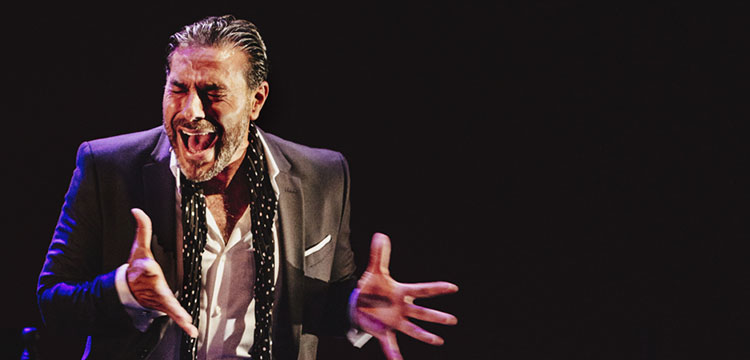Voice: Pedro ‘El Granaíno’. Guitar: Antonio Patrocinio and El Perla. Piano: Cristian de Moret. Chorus and rhythm: Los Mellis. Teatro Lope de Vega. September 14th, 2018. Full house.
Sara Arguijo
Amidst cheers of “great!”, “tremendous!”, “long live flamenco!” and “ole for great voices!”, Pedro el Granaíno left the stage after more than fifteen minutes of applause on a glorious night in which the singer was anointed one of the foremost stars of flamenco singing.
In actual fact, this was the feeling among the audience from the outset. Because, after leaving no doubt about his flamenco objectives with the song “Dicen que para Cantar”, that he interpreted along with the piano of Moret, and in which he defended the heart as being the most important element, and later showing that in soleá, thanks to his sensitivity and good taste, he already had the audience in the palm of his hand and the atmosphere smelled of triumph.
In fact, this is one of the main qualities of El Granaíno, that he makes “deep song” accessible to spectators unfamiliar with the beauty expressed in his mysterious vocal cords, and due to his innate capacity to transmit emotion in everything he sings, even the most difficult forms. For this reason, it came of no surprise that when he offered a dedication to his daughter Silvi, he commented that she only likes “papa and Maluma”. After all, classic references are to be found in his singing, voices such as that of Tomás Pavón and Chocolate, in addition to more contemporary ones – Camarón, Morente, Remedios Amaya, Rancapino – which he uses to defend the great body of flamenco from the 1980s and connect with younger generations.
Furthermore, with time, he has found how to rid himself of certain bad habits from singing for dancers and discovered how to best deliver what he has to offer. At this point in time, El Granaíno sings with greater self-assurance, savoring the verses and squeezing out the words to such a point that when he sings the line about “open was the rose” (from Morente’s “El Lenguaje de las Flores”), he seems to be actually pulling away the petals of the flower with his haunting voice. “Sometime his cries singing” we can hear him say to his aunt from the seat behind.
Of the entire recital, the best was the beginning, and especially the gently rocked soleá and the delicate tientos in which the idealist guitar of Antonio Patrocinio was pushing the swing of the singing and pulling spontaneous applause. The guitarist, perhaps somewhat underestimated, accompanied masterfully during this first part (ending with granaína and malagueña with abandolao and tangos), giving the singer the required feeling of fantasy. To come back down to earth with siguiriya, mining songs and bulerías, another guitarist: el Perla, a hot and very flamenco guitar who took the Granada singer to another more stable place. And all the while, the rhythm and melodic choral singing of the very enjoyable Mellis.
All in all, a magical night in which emotion won out. We do hope the singer will now offer a renewed repertoire with new and original verses, and that he doesn’t limit himself to reproducing those we’ve been hearing too long.
Photos: Oscar Romero / La Bienal
